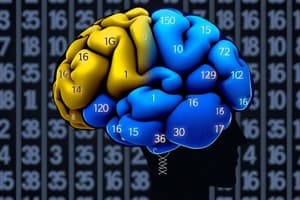Podcast
Questions and Answers
Which of the following is NOT one of the five factors of intelligence measured by the Stanford-Binet (SB5) test?
Which of the following is NOT one of the five factors of intelligence measured by the Stanford-Binet (SB5) test?
- Fluid reasoning
- Knowledge
- Social intelligence (correct)
- Quantitative reasoning
What is the main difference between individual and group intelligence tests?
What is the main difference between individual and group intelligence tests?
- Individual tests are more valid than group tests
- Group tests are more comprehensive than individual tests
- Group tests are more efficient than individual tests (correct)
- Individual tests are more reliable than group tests
Which theory of intellectual abilities is the Stanford-Binet (SB5) test based on?
Which theory of intellectual abilities is the Stanford-Binet (SB5) test based on?
- Piaget's theory of cognitive development
- Spearman's theory of general intelligence
- Gardner's theory of multiple intelligences
- Cattell-Horn-Carroll theory of intellectual abilities (correct)
What are the four factors of intelligence measured by the Wechsler Adult Intelligence Scale (WAIS-IV)?
What are the four factors of intelligence measured by the Wechsler Adult Intelligence Scale (WAIS-IV)?
What are the additional composite scores of the Wechsler Adult Intelligence Scale (WAIS-IV)?
What are the additional composite scores of the Wechsler Adult Intelligence Scale (WAIS-IV)?
Which type of intelligence test is more appropriate for large numbers of participants?
Which type of intelligence test is more appropriate for large numbers of participants?
What type of intelligence is measured by both the Stanford-Binet (SB5) and Wechsler Adult Intelligence Scale (WAIS-IV)?
What type of intelligence is measured by both the Stanford-Binet (SB5) and Wechsler Adult Intelligence Scale (WAIS-IV)?
Flashcards are hidden until you start studying
Study Notes
Intelligence Testing: Information-Processing Theories, Individual vs Group Tests, and Benchmark Measures
- Information-processing theories focus on how intelligence is processed, rather than what is processed.
- Intelligence tests can be administered individually or in groups.
- Individual tests are used in educational psychology to observe problem-solving, but require specialized training and time.
- Group tests are used for large numbers of participants and require less skill to administer.
- The Stanford-Binet (SB5) test and the Wechsler scales for adults and children are the most well-known individual tests of intelligence.
- The SB5 measures five factors of intelligence, including fluid reasoning, knowledge, quantitative reasoning, visual-spatial processing, and working memory.
- The SB5 test has high internal consistency and test-retest reliability, as well as criterion-related validity.
- The Wechsler Adult Intelligence Scale (WAIS-IV) measures four factors of intelligence: verbal comprehension, perceptual reasoning, working memory, and processing speed.
- The WAIS-IV has additional composite scores, including the General Ability Index (GAI) and the Cognitive Proficiency Index (CPI).
- The WAIS-IV has high internal consistency and validity through concurrent, convergent, and discriminant studies.
- Both the SB5 and WAIS-IV measure a mixture of crystalized and fluid intelligence.
- The SB5 is based on the Cattell-Horn-Carroll theory of intellectual abilities.
Studying That Suits You
Use AI to generate personalized quizzes and flashcards to suit your learning preferences.




